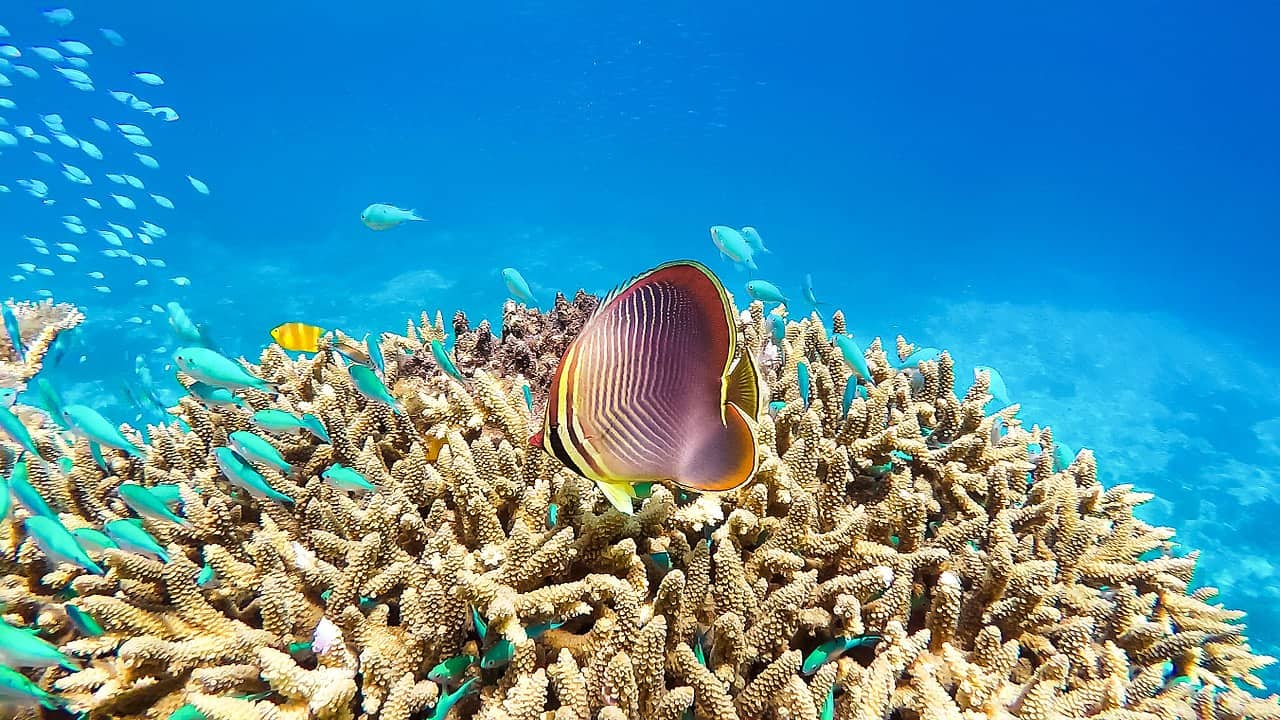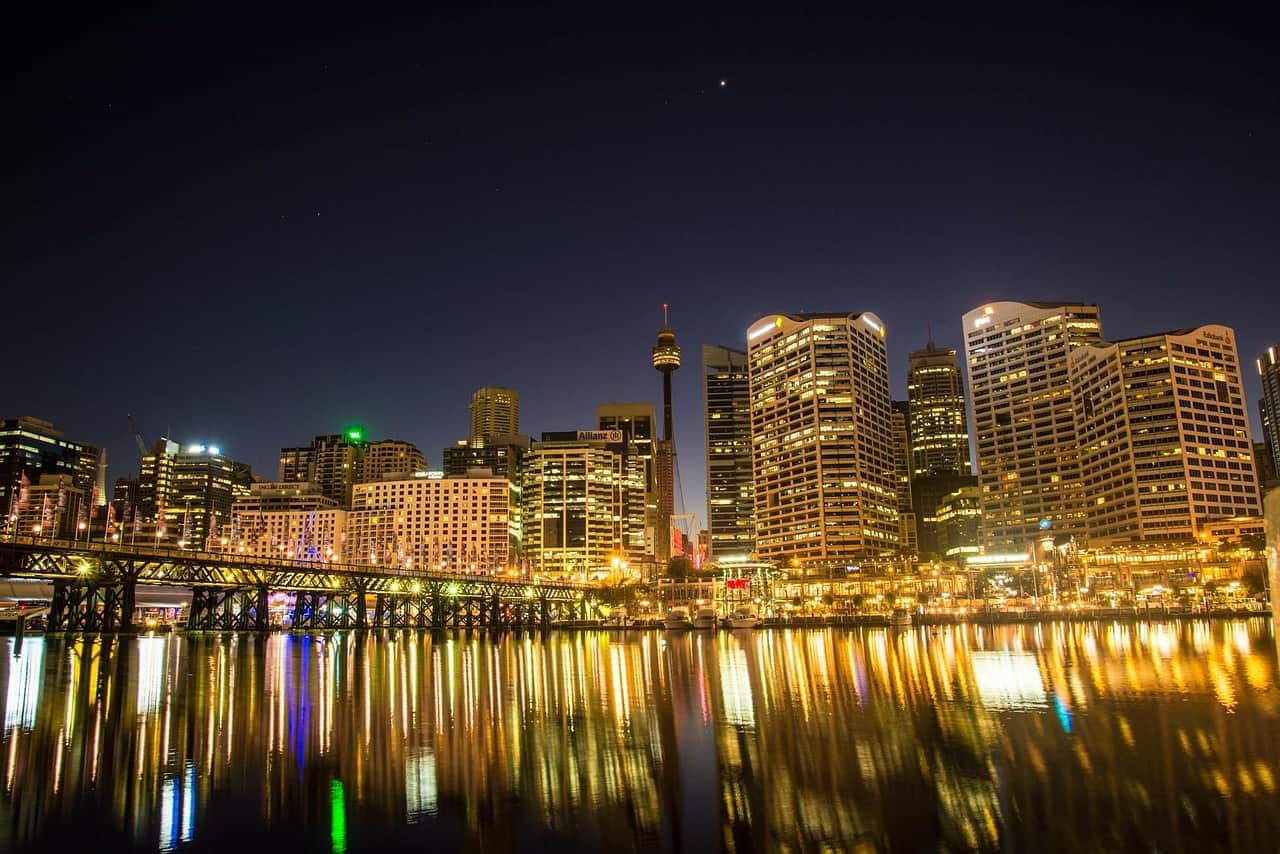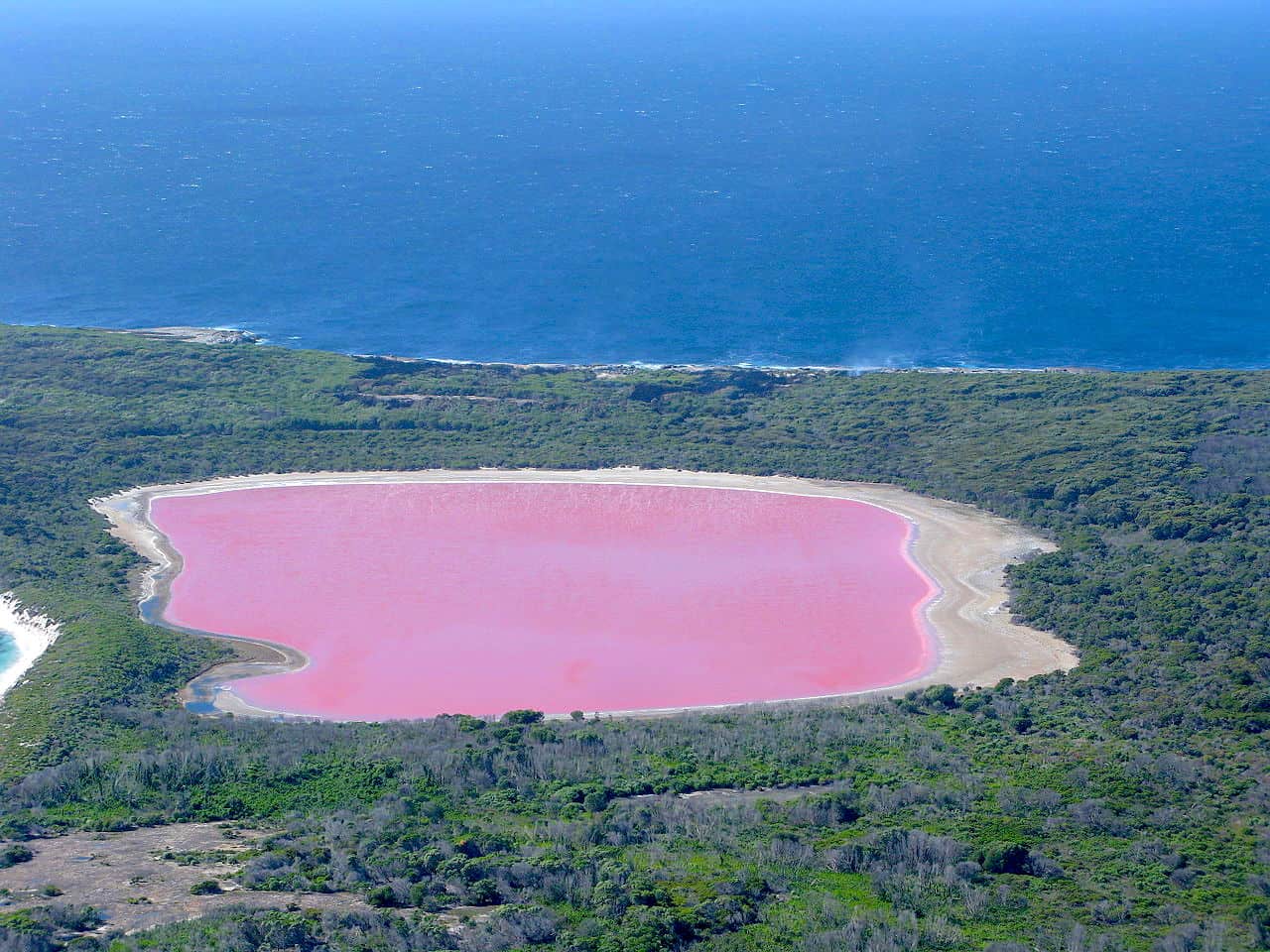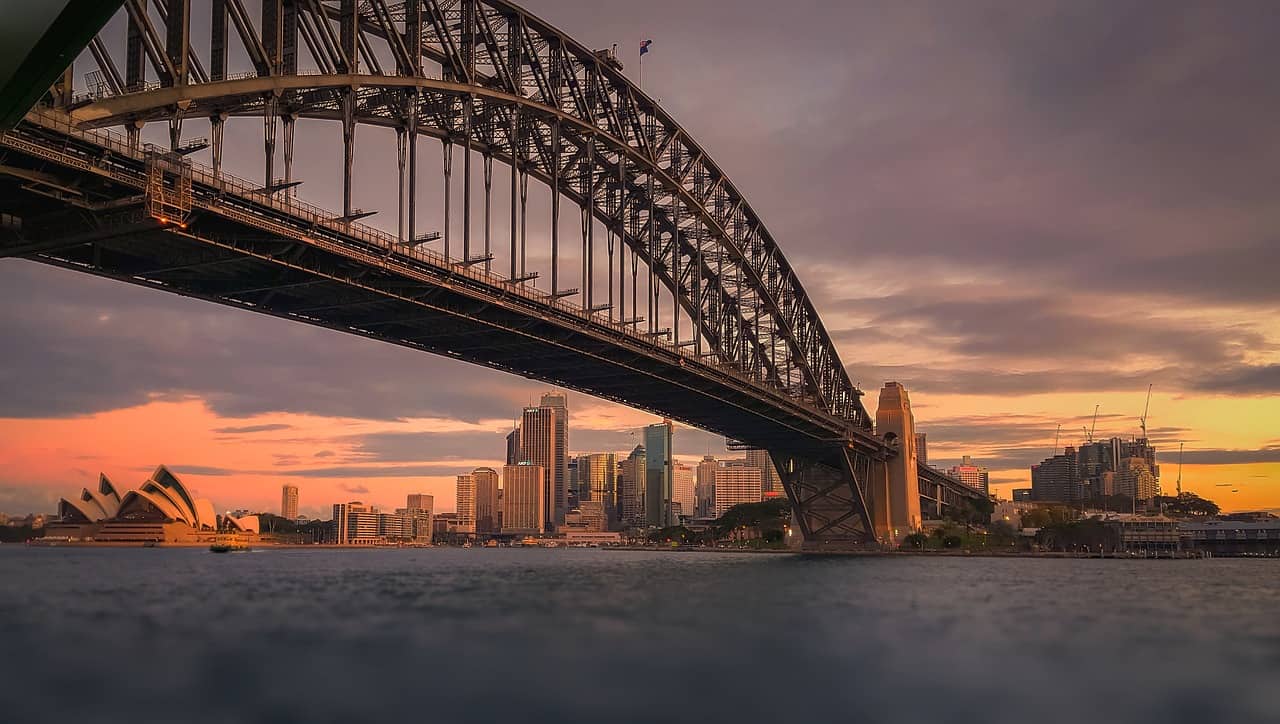
- Australia has more kangaroos than people.
- There are over 10,000 beaches in Australia.
- Australia has inhabitants 50,000 years before the British came.
- Melbourne, Australia has the largest Greek population outside of Greece.
- The Australian Alps get more snow compared to Switzerland.
- Australians eat kangaroo meat.
- Australians eat crocodile meat.
- The national animal of Australia is the kangaroo.
- An Average Australian drink 96 liters of beer per year.
- The Australian Dollar (AUD) is Australia’s currency.
- There are 8 sheep for every person in Australia.
- Australia discovered a fish in the year 2015 and named it “Blue Bastard”.
- Australia created its version of football rules for their league.
- Australia has more camels than Egypt.
- The name ‘Australia’ comes from the Latin word ‘Terra Australis’ that means southern.
- The real country name of Australia is the Commonwealth of Australia.
- 90% of Australians live near the sea or at the edge of the land.
- Tasmania, Australia has the cleanest air in the world.
- Fraser Island, Australia is the largest sand island in the world.
- The Indian Pacific train of Australia is the longest straight section of train tracks in the world.
Australia is the smallest continent.
Australia is the smallest of all the continents. It is also the flattest, the lowest and the driest.
Australia has 8 states.
The 8 states of Australia are namely: Queensland, New South Wales, Australian Capital Territory, Victoria, South Australia, Western Australia, Tasmania, and the Northern Territory.
Victoria is the garden state of Australia.
Victoria, Australia has the nickname “The Garden State” because of its fertile agricultural land.
Australia has 160 spoken languages.
Australia has 160 spoken languages. Although Australia has no official language, the considered official language is English. The majority of the population speaks English. An awesome Australia fact!
January 26 is the official national day of Australia.
The official national day of Australia is ‘Australia Day’. People celebrate it on the 26th day of January. This special day is a remembrance of the 1788 arrival of the First Fleet of British ships at Port Jackon, New South Wales. It also remembers the raising of the Flag of Great Britain at Sydney Cove by Governor Arthur Philip.
Australia has 3.6 million hectares of rainforest.
3% of Australia’s total native area is the rainforest. Australia has 3.6 million hectares of rainforest. It is usually characterized by lush growth, high rainfall, and closed canopies. Rainforests bolster up a remarkable part of Australia’s biodiversity.
Australia has a population of 25.4 million.
Australia is the 55th largest country in the world with an estimated total population of 25.4 million. Authorities expect that Australia’s population will continue to grow. Specifically, the migration will play a notable role in that growth.
James Cook discovered Australia in 1770.
It took some time before someone discovered Australia. Captain James Cook led the most famous discovery aboard HMS Endeavour in 1770. Eventually, this voyage led to the first European settlement in Sydney.
Vegemite is the most popular spread in Australia.

Vegemite is a dark brown spread invented by Dr. Cyril P. Callister, a chemist. The texture of Vegemite is sticky with a salty, malty and slightly bitter taste. Aussie parents raise their kids and toddlers on Vegemite. It’s one of the first foods that parents give to them because of their nutritional value.
There are at least 125 Australian slang words and phrases.
Here are some of those Australian slang, such as: A cold one (Beer), Barbie (Barbecue), Bathers (Swimsuit), Billy (Teapot), Brolly (Umbrella), Brekky (Breakfast), Cactus (Broken), Coppers (Policemen), Dunny (Toilet), Deadset (True) and Sanger (Sandwich).
Australia takes 5% of the world's land area.
The land area of Australia is 7,682,300 square km. This is 5% of the world’s land area of 149 450 000 square km. In fact, Australia is about 2 times bigger than India.
Australia banned all semi-automatic rifles and pump-action shotguns.
Gun laws in Australia are mainly within the jurisdiction of Australian states. In the last 20 years, several high-profile gun violence has been recorded. The federal government coordinated more restrictive firearms legislation with all state governments. Gun laws were largely aligned in 1996 by the National Firearms Agreement. Finally, Australia bans all semi-automatic rifles and pump-action shotguns.
There are different time zones in Australia.
The time zones in Australia are the Western Standard Time, Central Standard Time, and Eastern Standard Time. Australia’s standardization of time started in 1892. The representatives accepted the recommendation of the 1884 International Meridian Conference to use the Greenwich Mean Time.
The capital of Australia is Canberra.
Contrary to the thinking of many that Sydney is the capital of Australia, Canberra is the actual capital of Australia. Canberra is on the south-eastern side of Australia.
The Sydney Opera House took 14 years to build.
The Sydney Opera House gets 10.9 million visitors every year. Builders expected the construction of the Sydney Opera House to take 4 years. But it eventually took 14 years to build with 10,000 construction workers.
The Dingo Fence is longer than the Great Wall of China.
Dingo Fence of Australia is the world’s longest fence, its 5,331 kilometers in length. The Dingo Fence is a ‘pest-exclusion’ fence built in the 1880s and completed in 1885. Its main purpose is to shield the fertile south-east part of Australia from dingoes. The Dingo fence is longer than the Great Wall of China.
Australia's first policemen were criminals.
The first cops in Australia were a group of convicts. Laying down the rules set by Governor Arthur Philip, the first fleet arrived in New South Wales in January 1788. The Marines of the Royal Navy were in charge of law enforcement.
Some of the world's deadliest animals live in Australia.
Some of the world’s deadliest animals live in Australia. Such as Common Death Adder, Coastal Taipan, and Blue-Ringed Octopus.
The world's largest coral reef system, the Great Barrier Reef, is in Australia.

It stretches for 2,300 kilometers over an area of approximately 344,468 square kilometers. The Great Barrier Reef is the biggest coral reef system in the world. The reef is off the coast of Queensland, Australia, in the Coral Sea.
Australia is a spacious country.
If we are going to scatter all the people in Australia, there will only be 3 people for every 100 hectares all around the country.
Australia has diverse religions.
Religious beliefs in Australia are diverse. But there are more people there that do not have a religion. 30% of them do not have a religion. 22% are Catholic, 16% are Christians, 13% are Anglican, 2% are Buddhist, 2% are Islam and the others remain undecided.
Australia has the world's longest golf course.
The longest golf course in the world is the Nullarbor Links. Measuring more than 850 miles long with an 18-hole par 72 golf course, this golf course took 5 years to build.
There are 150 million sheep in Australia.
There are 150 million sheep in Australia with 20 million people. That’s around 8 sheep for every person. How about the kangaroos? Australia has 25 million kangaroos.
The Great Emu War broke out in Australia.
The Emu War of Australia is the war of man vs the birds. Emus are very big birds with heights at an average of no less than 5.7 feet, the second-largest living birds. They have long legs and necks with short wings (less than 8 inches). When the emus grew in numbers, they started to wreak havoc on crops and that started The Great Emu War of Australia.
The government hired former World War I soldiers to fight the emu.
The soldiers used the Lewis machine gun, a light machine gun that was widely used in the first world war. They used that gun against emus in Australia, more than a decade later.
Emus won the war!
It took about 10 bullets to kill a single emu, hence the officials decided that it is not worth it. Major Meredith was the leader of the war, but in the end, the emus won! And one of the soldiers quoted “The emus have proved that they are not so stupid as they are usually considered to be.”
Australia is the 6th largest country in the world.
Australia is the 6th largest country after Canada, United States, Russia, Brazil, and China.
Australia is the biggest island in the world.
Even if Australia is the smallest continent in the world, it is also the world’s biggest island. There is an ongoing debate that Greenland should be the world’s biggest island since Australia is a continent. However, Australia still has the “qualifications” of an island.
Sydney has more than 100 beaches.

In Sydney, Australia, there are over 100 beaches in the city located in rivers, bays, and harbors. The Pacific Ocean coastline reaches several meters to a few kilometers.
There are more than 1.6 million dairy cows in Australia.
There are more than 1.6 million dairy cows in Australia. These cows produce an average of 5,500 liters of fresh milk every year.
5% of the cows suffer from mastitis.
5% of the dairy cow in Australia suffers from mastitis. It’s an inflammation of breast tissue. This may involve infection and inflammation. It can result in swelling, warmth, redness, and breast pain that may lead to fatality.
Australia set a new Guinness World Record in Bondi Beach.
Australia set a new Guinness World Record for the largest female swimsuit group photoshoot in 2007. 1,010 women put on their swimsuit and headed to Bondi Beach to set the record. One of the participants said: “As an Australian myself, it’s logical that any record involving sun, sand and surf should be in this country”.
Australia has regular thunderstorms.
Not far away in the Northwest Coast of Australia, thunderstorms happen regularly. More than 40 thunderstorms come to pass every year. Central Queensland encounters 50 thunderstorms a year. The thunderstorms usually come during the monsoon and winter season.
The Prime Minister of Australia disappeared while swimming.
On December 17, 1967, Prime Minister Harold Holt went to Cheviot Beach with his friends to swim. Prime Minister Holt and his friends were on the beach around 12:15 pm. According to his friends, Mr. Holt went into deeper and deeper water. Then, the Prime Minister disappeared. Authorities conducted an enormous search operation after the incident. At one point, there were 50 divers simultaneously looking out for the body but no one found it.
Conspiracies about Prime Minister Harrold Holt's disappearance spread around the world.
There are many conspiracy theories for Prime Minister Harold Holt’s disappearance. First, Harold Holt was a Chinese spy and he was picked up by a Chinese submarine and lived the rest of his life in China. Second, Harold Holt is a good swimmer and a diver and can hold his breath for a few minutes. Third, the CIA assassinated Harold Holt. According to this theory, the US thought he will pull out Australia from the Vietnam war. And finally, Harold Holt faked his death and moved to Switzerland with his lover.
Australia created the world's first Seat Belt Law as mandatory in 1970.
In 1970, the city of Victoria mandated the first seat belt law. It requires all passengers and drivers to use their seat belts all the time while inside the vehicle. As a result, driving around is safer.
Gina Rinehart is Australia's richest woman.
Gina Rhinehart is a mining magnate and company chairman. She earns an estimated 600 AUD a second or over 2,000,000 AUD per hour, giving her the title of Australia’s richest woman.
Prime Minister Bob Hawke holds a Guinness Record.
Australia is a home for interesting Prime Ministers. From Prime Minister Harold Holt’s disappearance, then to Prime Minister Bob Hawke. The former Prime Minister Bob Hawke set a world record for sculling 2.5 pints of beer in just 11 seconds. As a result, he set a record in the Guinness Book of Records. One of the coolest Australia facts!
Australia has 21 of the world's 25 most venomous snakes.
Here are some, such as Inland Taipan Venom, Eastern Brown Snake, Western Brown Snake, Mainland Tiger Snake, and Coastal Taipan.
An average of 70 tourists overstay their visa in Australia every week.
Tourists in Australia tend to overstay. Reports have shown that most of them are Malaysians and Chinese. While the Americans, British, and Indian also adds a small part of it. The department said that it will not detain the overstaying tourists if they work with the government to clear up their cases.
Canberra actually means "a woman's cleavage".
Canberra means “a woman’s cleavage” since two mountains cradle the city.
Native vegetation covers 91% of Australia.
Native vegetation covers 7 million square kilometers of the whole of Australia.
Australia is one of the driest inhabited places on earth.
It has the lowest water level of rivers. Australia has the lowest run-off, and also the smallest area of permanent wetlands of all the continents. One-third of Australia has almost no run-off at all. Australia has the most inconsistent rainfall and stream-flow as well.
Australia has pink lakes.

Western Australia has several pink lakes such as Lake Hillier and Hutt Lagoon. The reason for its pinkish color is a subject that is not fully understood by scientists yet. But they are guessing it has to do with the existence of the Dunaliella salina microalgae.
Australia exports ten thousand camels every year.
The country exports about 10,000 camels to the Middle East by Australia mainly for their meat, worth 2,000,000 AUD. Australia first exported the camels in Brunei and Malaysia. But it is the Middle East that grabs more market share today with high-rising demand.
The Australian election TV debate gave way for the reality show Masterchef.
An Australian election TV debate was rescheduled to give way for the season finale reality cooking show Masterchef. The debate is usually at 7:30 pm with the same time slot of Masterchef. More than 4 million Australians were expected to watch Masterchef, so the election TV debate moved 1 hour earlier and started at 6:30 pm.
Australia is the 5th largest wine exporter in the world.
The wine industry of Australia stimulates its economy through employment, tourism, and export. The Australian wine industry ranks 5th in the world as the largest wine exporter. It has an estimate of 780 million liters per year to the international export market. Locals consume 40% of the wine.
An Australian man tried to sell New Zealand in an auction.
An Australian man tried to sell New Zealand in an auction at a starting price of 00.01 AUD on eBay. There are 22 bids in total and it went as high as 3,000 AUD. Even though everyone knew that it was just made for fun, the foreign Minister of New Zealand did not like it.
ASIC is one of the world's most trusted financial regulators.
The Australian Securities and Investments Commission is one of the world’s most trusted regulators. Most foreign Forex traders prefer Australia due to its credibility and security of the client’s fund. Most notable Forex online brokers are namely: IC Markets, Pepperstone, and Axi Trader.
27% of Australians were born abroad.
Australia is the world’s highest proportion of migrant settlers in a developed country. 27% of Australians were born abroad. 46% of Australian households had at least one parent born overseas.
The government chose Canberra as the capital on January 1, 1911.
Canberra became the capital of Australia on January 1, 1911. It’s due to Australians having a hard time to choose between Melbourne and Sydney. Melbourne and Sydney had a ‘historic rivalry’. That is why Canberra becomes the tiebreaker.
Melbourne, Australia is consistently listed at the global liveability index.
Year after year, Melbourne, Australia is consistently listed at the Global Liveability Index. The city has a rating of 98.4. It attains a score of 100 in education, healthcare, and infrastructure. Also, Melbourne has many public transport choices, low crime rates, and plenty of job opportunities.
The Ayers Rock of Australia is the world's largest rock.
Uluru, also known as Ayers Rock is right in the center of the map of Australia. The Ayers Rock is 2,831 feet and it is the world’s largest rock. Uluru is sacred to the Pitjantjatjara Anangu, the Aboriginal people of the area. One of the historical Australia facts!
Christmas is summer time in Australia.
Christmas in Australia comes at the beginning of summer. The summer holidays start from mid-December to early February. Thus, some people go camping during Christmas. Since it is so hot during Christmas time, there are often massive bush fires across the country. However, there is not much difference in terms of celebrations.
Santa Claus surfs in Australia, what?
Australia won a Guinness World Record for most surfing Santa Claus. There were 320 Santa Claus at Sydney’s Bondi Beach who performed to set a new world record.
Australia ranks 26th in the world's most obese countries.
The country has 29.9% overweight people in the population. Obesity is becoming a major public health issue in Australia. While those outside the major cities of Australia are less affected by this health issue.
Australia has the world's longest national highway.
Australia’s Highway 1 is the world’s longest national highway road in the world. It has a length of 14,500 kilometres. Millions of travelers use the route every day going the work or any destinations they desire around Australia.
Australia does not have an official national sport.
Australians love sports such as cricket, rugby, football, basketball, and golf. It has a long sporting history but does not have officially a national sport.
Australia has the world's happiest animal.
Australia has the world’s happiest animal, the quokka. This animal has become the most popular tourist attraction at Australia’s Rottnest Island. Quokka is part of the kangaroo and wallaby family.
Australians love poker.
The country is home for 20% of the world’s poker machines. Every year, Australians gamblers lose up to 16 billion AUD in playing poker every year. In fact, there is a demand for online poker games and it continues to grow in Australia.
The word "selfie" originated in Australia.
It started when a drunk Australian uploaded a self-portrait photo. As it continues to trend in the media, the Oxford Dictionary has named it the word of the year. Now over 25 billion selfies are up online.
Forest fires are common in Australia.
Forest fires and bushfires are very common in Australia because of the climate. But trees in Australia can explode, as eucalyptus trees produce flammable oil. So when there is a forest or bushfires, eucalyptus trees are burning like fireworks.
Australians use green ants as an ingredient.
These ants measure between 5 to 7 mm. Green ants are also used as an ingredient for goat cheese (chevre). In fact, indigenous societies favoured these ants for their protein content and medicinal benefits.
Avatar is the highest-grossing film of all time in Australia.
Avatar is the highest-grossing film in Australia. It has box office earnings of $115,623,586 as of 11 January 2019. It was the first film released in Australia to earn over $100 million. Followed by Star Wars: The Force Awakens in second place with $94,034,676 earnings. Avengers: Infinity War followed with $61,865,083 earnings claiming the third spot.
The fish industry is now a multibillion-dollar business in Australia.
It is now a multibillion-dollar business in Australia. Aussie love fish and seafood, and is part of their diet, around 16 kilograms per Aussie per year.
Dr. Mark Lidwill invented the pacemaker.
In 1926, Dr. Mark Lidwill invented the pacemaker at the Crown Street Women’s Hospital. Dr. Mark Lidwill treated a stillborn baby whose heart continued beating after 10 minutes with his invention. His invention, the cardiac pacemaker, has saved countless lives. Australian Geographic listed it amongst the top ten Australian inventions that changed the world. But because of ethical concerns, Dr. Lidwill refuses to acknowledge his invention.
There is a Christmas Island in Australia.
It is also known as the Galapagos of the Indian Ocean. The island is a rocky speck in the Indian Ocean lying south of Java, Indonesia. Christmas Island is famous for its wildlife, such as red crabs, whale sharks, seabirds, and coral reefs. The island is close to Asia than mainland Australia. It’s home to an artful of cultures and some of the world’s most spectacular natural wonders.
Red crabs live on Christmas Island.
120 million red crabs are living on Christmas Island, Australia. Like most land crabs, red crabs use gills to breathe. They also must take great care to conserve their body moisture.
Melbourne was previously called Batmania.
Before Melbourne was Melbourne, it was shortly called Batmania. It was after one of its founders, John Batman. John Batman was an entrepreneur, explorer, and Australian grazier.
50.7°C is the highest temperature ever recorded in Australia.
The record was 50.7°C or 123.3°F. Climate change and global warming are becoming an Australian is a political issue. Australia’s hottest months are usually December, January, and February.
The coldest temperature in Australia is -23°C.
Australia also experiences extreme cold weather. For instance, it has recorded its lowest at -23°C or -9.4°F. The coldest months are usually June, July, and August.
The Sydney Tower was the tallest building built in 1981.
The Sydney Tower was the tallest building built in 1981 in Australia. It is the second tallest observation tower in the Southern Hemisphere at 1,001 feet. Also, there is a Sydney Tower Stair Challenge that happens every year. In fact, it’s open to everyone interested to take part in climbing 1,504 steps to the top.
The Sydney Harbour Bridge took 8 years to construct.

The Sydney Harbour Bridge construction started on 28 July 1923. There are 1,400 workers used for labor and construction was completed after eight years. Builders used roughly 6 million hand-driven rivets, 53,000 tons of steel and 272,000 liters of paint.
A linguist debunked the old kangaroo story in 1970.
When Captain James Cook exploring the land of Australia, he saw an animal and asked an Australian native its name. The native replied “Kangaroo”, translated to “I don’t understand you”. But Cook thought that was the name of the animal. However, linguist John B. Haviland debunked this old story in 1970.
David Warren invented the flight data recorder.
His invention often solved cases on air crash investigations. In fact, it also brought improvements in the aviation history.
Australia celebrates Anzac Day on 25th April.
Every 25th of April, Australians celebrate Anzac Day. This commemorates those who served and died in all wars, conflicts, and peacekeeping operations.
The boomerang is a popular Australian icon.
Aboriginals used boomerang as a weapon. They also used it boomerangs in huntings as well as sports and entertainment in the modern era.
Australia is one of the lowest and flattest countries in the world.
Australia is one of the lowest and flattest countries in the world. The lowest point in the country is Lake Eyre in Northern South Australia. It is approximately 15 m below sea level and the highest is Mount Kosciuszko at 2,228 m above sea level.
95% of opal stones primarily come from Australia.
These amazing stones are from Australia’s Opal fields that lie in the three states of New South Wales, Queensland, and South Australia.
Melbourne was the first capital of Australia.
Melbourne was the capital of Australia for 26 years from 1901 to 1927 before the capital shifted to Canberra.
Hope these Australia facts taught you something about Australia! So what are you waiting for? Book a flight to Australia soon! Maybe these Australia facts made you interested to see what the country has to offer.
Was this page helpful?
Our commitment to delivering trustworthy and engaging content is at the heart of what we do. Each fact on our site is contributed by real users like you, bringing a wealth of diverse insights and information. To ensure the highest standards of accuracy and reliability, our dedicated editors meticulously review each submission. This process guarantees that the facts we share are not only fascinating but also credible. Trust in our commitment to quality and authenticity as you explore and learn with us.


